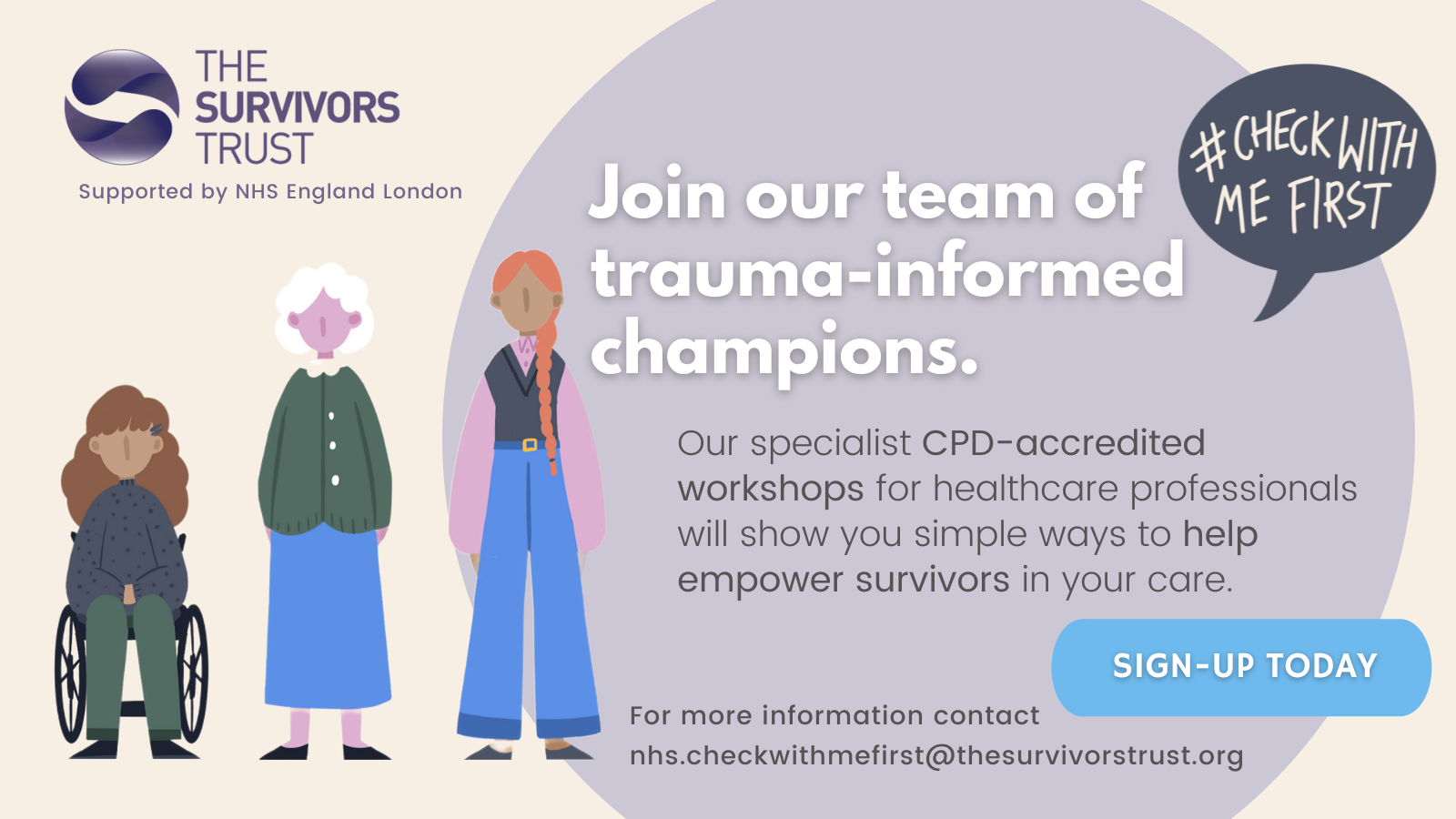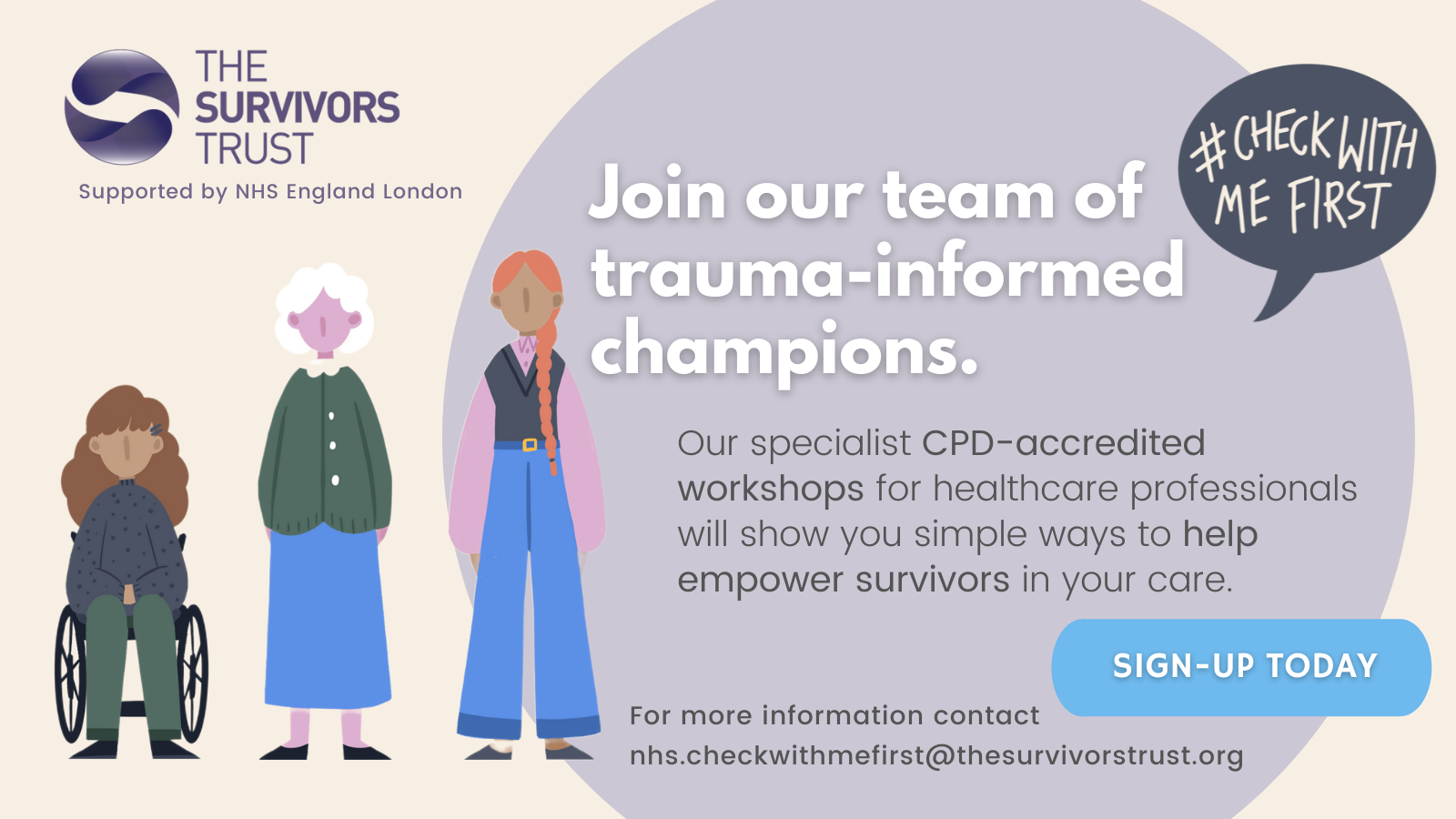Monthly archives: February 2022
Cross-site network issue now resolved
Please be aware the cross-site network issue that affected messaging between some clinical systems this morning has now been resolved and all system should be returning to normal operation.
Business continuity plans which were enacted can now be stood down.
We apologise for any inconvenience this outage may have caused.
Colleagues are advised to return to normal operation and ensure they report any further issues that may arise to the 24 hour IT service desk on ext. 4050 or 0121 507 4050 for home workers
#CheckWithMeFirst: Supporting survivors with trauma-informed care

Survivors of sexual abuse and violence have said time and time again that one thing that would really help them get through their medical appointments would be for healthcare professionals to let them know what they need to do and why, and to ask for consent, for every step of the procedure.
This is the core principle of the #CheckWithMeFirst campaign – understanding that taking a moment to consent, discuss and support a patient goes a long way to supporting them to have a positive experience.
#CheckWithMeFirst aims to encourage NHS professionals to make small but crucial adjustments in their approach, for example, explaining what will happen and asking the person under their care if there is anything that makes them feel anxious about the procedure before and during it, enabling the person to feel more in control. It also aims to empower survivors to let their practitioner know what might help them to better cope with their appointment, whether or not they choose to disclose recent or non-recent abuse.
If you would like to take part in the training workshops, please find the booking instructions here: Training and support to become a trauma informed champion supporting survivors of sexual abuse
The workshops will be accessible to Trust colleagues and will cover trauma-informed practice, the prevalence of sexual abuse and how this impacts the way that survivors access healthcare services, handling disclosures, and how to refer survivors to specialist support.
Job of the week: Departmental Secretary, Band 4 (secondment)
An exciting opportunity has arisen for a highly motivated individual to join the Emergency Preparedness, Resilience and Response (EPRR) team at SWBH. The team are looking for an enthusiastic and reliable individual to join the team and help to shape our EPRR processes for the future.
The post is ideal for an ambitious individual with strong administration and organisational skills. The ideal candidate will be well organised and have a systematic approach, with the ability to use their own initiative, work unsupervised to prioritise workloads and escalate as appropriate. Excellent communication skills and the ability to work with multiple stakeholders is essential.
The successful candidate will work under the direction of the EPRR officer and will act as an initial point of contact for enquiries regarding EPRR. The role will include provision of administrative support to the EPRR team in arranging meetings, developing agendas, producing minutes/action notes and a variety of other tasks to support the delivery of the EPRR work plan. The post holder will also be involved in maintaining our core EPRR records and systems, as well as supporting the management of our On Call rotas.
If you have secretary and admin experience, have initiative and have an understanding of EPRR please discuss this secondment/development opportunity with your current line manager and forward your expression of interest to philip.stirling@nhs.net by Monday 21 February stating why you want this opportunity, your relevant experience and how this fits in with your career development plans.
Birmingham Commonwealth Games 2022: Batonbearer nominations

Do you know somebody who is ready to step forward, make a change, and take it on?
The organisers of the Birmingham Commonwealth Games are looking for looking for individuals that meet one or more of the following criteria:
- Always willing to take on a challenge and has a unique and inspiring story
- Has made a meaningful contribution to sport, education, the arts, culture, or charity
- Is a figure of inspiration that positively challenges others to achieve their best
- Has taken on a challenge or cause and made a positive impact within their community.
Nominations close at the end of February, ready for a panel review in March 2022.
The Queen’s Baton Relay will travel to every region in England, before arriving at the opening ceremony of the Commonwealth Games on Thursday 28 July.
To nominate a person and to find out more, please click here.
Drop-in vaccination clinic at Rowley Regis Hospital
A drop-in vaccination clinic will take place at Rowley Regis Hospital on Thursday 17 February, 9am – 4pm on the Westwood ward. The vaccination hub will be administering first, second and booster does of COVID-19 vaccines plus third doses for individuals aged 12 years and over with severe immunosuppression. The clinic is open for all colleagues and members of the public. You can also get your flu jab – it’s not too late.
If it’s more convenient for you to access City Hospital or Tipton Sports Academy, the vaccination clinics are open every day between 8am-6pm for walk-ins. You can also book an appointment between 8am-7pm by calling the vaccination hub on 0121 507 4404.
Act now and keep yourself safe. Visit a vaccination hub or drop-in clinic to get your flu jab and COVID-19 vaccinations.
Corporate PowerPoint template
Are you looking to create a PowerPoint presentation? Perhaps you’ve been tasked with presenting to your team, your mangers or external contacts.
You might need a structured way to pitch an idea, some important information or a new service.
There is a corporate PowerPoint presentation template available to use for internal and external presentations. Please click here for the link to the template.
National Apprenticeship Week

This week is National Apprenticeship Week. The annual week-long celebration of apprenticeships aims to shine a light on the amazing work being done by employers and apprentices across the country.
To celebrate the awareness week, we will be promoting and sharing content about our apprentices and their fantastic contributions and efforts.
Be sure to check out this short video featuring Amy Thompson, HCA talking about why she recommends and apprenticeship.
Want to get in touch with our apprenticeship team? This week each member of the team will have a dedicated timeslot where you can catch up and have an informal chat about anything apprenticeship. Also be sure to get involved with the theme of day!
| Thursday 10 February – thank you Thursday | Helen Colbourne – Non-Clinical Apprenticeship Co-ordinator | 11am – 1pm | 07790 601269 |
| Julie Smith – Senior trainer | 11am – 1pm | 07970 882516 | |
| Friday 11 February – celebration Friday | Karen Whitehouse – Apprenticeship Coordinator | 11am – 1pm | 07976 075466 |
| Saturday 12 February – Parents/carers including Selfie Sunday | Karen Whitehouse – Apprenticeship Coordinator | 9am – 11am | 07976 075466 |
If you are interested in any degree and higher level apprenticeships, please take a look at what is available by clicking here and if something is of interest please contact swbh.apprenticeship@nhs.net for the next steps.
Heartbeat: Managing end of life patients in critical care

By Dr Jon Hulme, Consultant in Anaesthesia and Intensive Care Medicine
There are moments when as clinicians we need to have difficult conversations with our patients and their loved ones about planning for end of life. This can be very challenging for the patient, their family and us as healthcare professionals.
How do we have such conversations when the feeling can often be that our purpose is to do everything we can to save our patients?
As professionals we might be very aware when our treatment plans are simply not working for our patients and however difficult it may be, we need to instigate those conversations early and appropriately. Sometimes, this will be when a patient is able to communicate and understand; other times this will be with someone representing them because they cannot do so themselves. This is usually a close family member.
On intensive care, palliative care most often means stopping treatment that has been keeping a patient alive and making them as comfortable as possible at the end of life. We very much aim that we stop such life sustaining treatment, or do not increase the amount of life support to these levels, with the agreement of the patient and family members.
It becomes complicated when the patient is incapacitated. Very often, the possibility of end of life would have not been discussed prior to the patient getting ill, leaving family members in a difficult position as to what to do. Ultimately it is about explaining to families that life sustaining interventions have failed and they need to prepare for end of their loved one’s life.
Sometimes families will seek a second opinion, which we are happy to accommodate. In very rare occasions we have to seek a judgement from the Court of Protection in cases when the healthcare multidisciplinary team believes that continued life sustaining treatment is not in the best interests of the patient. Thankfully, this is an extremely rare occurrence.
Such conversations, explaining and discussing treatment escalation plans and end of life considerations, have been made even more difficult during the pandemic when we have to had to speak to family members on the phone or a video call – naturally we would prefer to do this face to face.
When end of life is planned well, it is a more dignified process for the patient. We (including the patient and family) are able to plan for the event and ensure the patient is as comfortable as they can be. Sometimes, they are able to be discharged home or move to a hospice from critical care if that is their wish.
Planning end of life is not easy. Everyone involved in the patient’s journey needs to have these conversations including the GP, admitting teams and those providing longer term care in hospital. Ultimately, it is about talking with people on a human level and understanding what their understanding, expectation and wishes are. When we take time to ask, we may be very surprised at how different this is from what we think is best for the patient.
Training for medics to have these conversations is now much improved. Trainee doctors are now trained and assessed by taking part in various scenarios. But for those of us who qualified years ago, this is did not happen. Many have learnt by experience and, just like after passing your driving test, bad habits and techniques can creep in. Even for those who do it well and frequently, some situations can be still very challenging.
If I had a piece of advice to give, I would encourage you to talk to your patient about what they want. And ask them, don’t tell them.
Ask yourself: is there a point when life would become unacceptable because you cannot do those things you hold most dear to you? And that is the core of what we ought to know about our patients’ wishes.
Join the fight against antibiotic resistance

So what can individuals do to help tackle antibiotic resistance? It might seem to be an overwhelming problem, like climate change, that individuals are powerless to do anything about, but that is not the case. Simple actions can help protect you, your family and loved ones. Not taking antibiotics when they aren’t needed is a great way to avoid the side effects they cause; antibiotics can alter the balance of bacteria in the gut and can have longer term health implications that we are only beginning to realise.
- Vaccination: Ensure you are up to date with any vaccinations you or family members require (e.g. pneumococcal vaccine, MMR). Vaccination is one of the most effective ways of preventing infectious diseases.
- Antibiotics cannot kill viruses, so they are no good for colds and influenza. If you have a cold, take care, not antibiotics. Make sure you get your flu jab, and make sure any family members who are eligible for a flu vaccine get their jab every winter. Visit your community pharmacist for help with self-care when you have a cold or sore throat. Ear infections are usually caused by viruses and evidence shows most get better with painkillers alone.
- Antibiotic resistance is one of the biggest threats facing us today and the overuse or misuse of antibiotics is making the problem worse. Without effective antibiotics many routine treatments will become increasingly dangerous. Setting broken bones, basic operations, transplants, even chemotherapy all rely on access to antibiotics that work. To slow resistance we need to cut the use of unnecessary antibiotics.
Would you like to become an antibiotic champion? We are currently seeking clinical colleagues who want to become antibiotic champions. This could be nurses, junior doctors, ward managers, registrars, pharmacists, consultants, matrons and pharmacy technicians – anyone who is interested in helping to improve the use of antibiotics at the Trust to improve patient care and limit the spread of antibiotic resistance.
If this is something of interest to you, please see the antibiotic champion information sheet for further details.
#CheckWithMeFirst: Making a difference to survivors of sexual abuse and violence

Survivors of rape and sexual assault are much more likely to suffer from Post-Traumatic Stress Disorder resulting in flashbacks, panic attacks, nightmares and depression.
Often when survivors of sexual assault need to visit a medical professional, memories can surface due to the nature of the examination and lack of control the person might feel. This can be so debilitating, that many survivors of sexual assault actively avoid seeking medical attention, making their condition worse. Survivors often make a choice not to disclose their experience of sexual assault or abuse to the authorities, and many survivors do not want their medical records to contain this information.
Three simple steps that healthcare professionals can take which make a difference to survivors’ experiences:
- Check that the service-user is happy before proceeding with and during each step of the appointment/procedure.
- Explain what you need to do at each step, and give the person opportunities to ask questions.
- Reassure the person that they can stop the procedure at any time. Let them know that they are in control.
If you would like to take part in the training workshops, please find the booking instructions here: Training and support to become a trauma informed champion supporting survivors of sexual abuse
The workshops will be accessible to Trust colleagues and will cover trauma-informed practice, the prevalence of sexual abuse and how this impacts the way that survivors access healthcare services, handling disclosures, and how to refer survivors to specialist support.
← Older items Newer items →